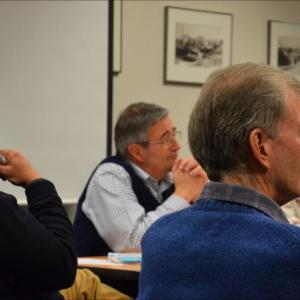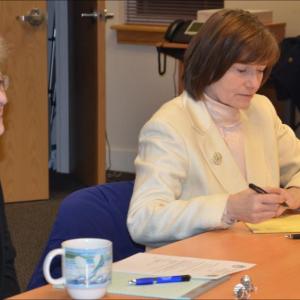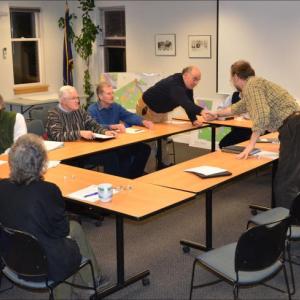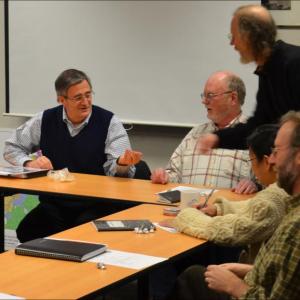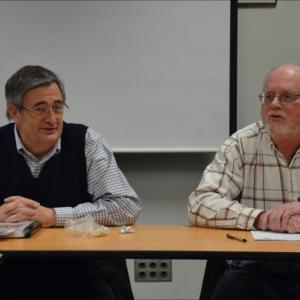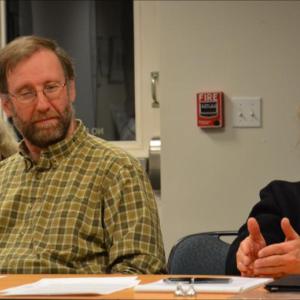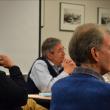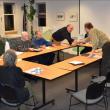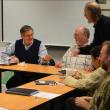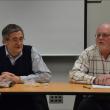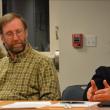Ideas flow for Camden-Rockport collaborations
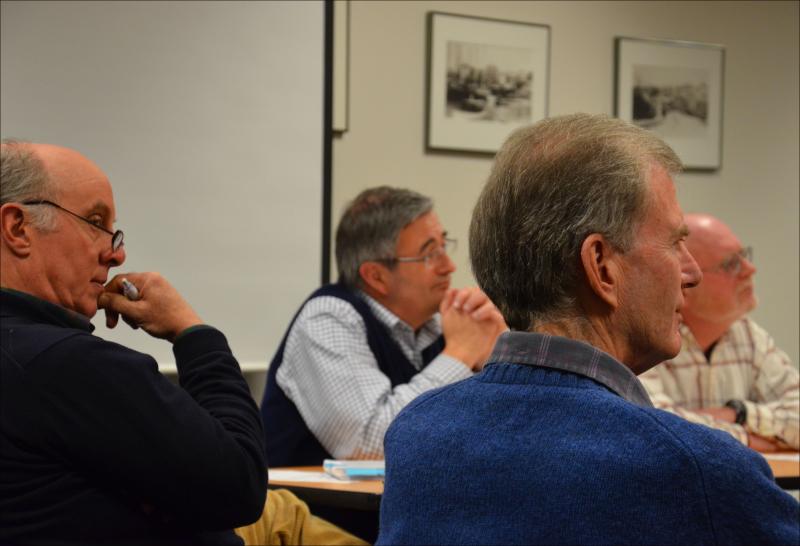 Camden and Rockport select boards convened a joint meeting Jan. 28 at the Rockport Town Office to expand local dialog about how to operate more efficiently together, and identify innovative collaborations. In the photo, Jim Heard and Martin Cates of Camden; and William Chapman and Charlton Ames, of Rockport. (Photo by Lynda Clancy)
Camden and Rockport select boards convened a joint meeting Jan. 28 at the Rockport Town Office to expand local dialog about how to operate more efficiently together, and identify innovative collaborations. In the photo, Jim Heard and Martin Cates of Camden; and William Chapman and Charlton Ames, of Rockport. (Photo by Lynda Clancy)
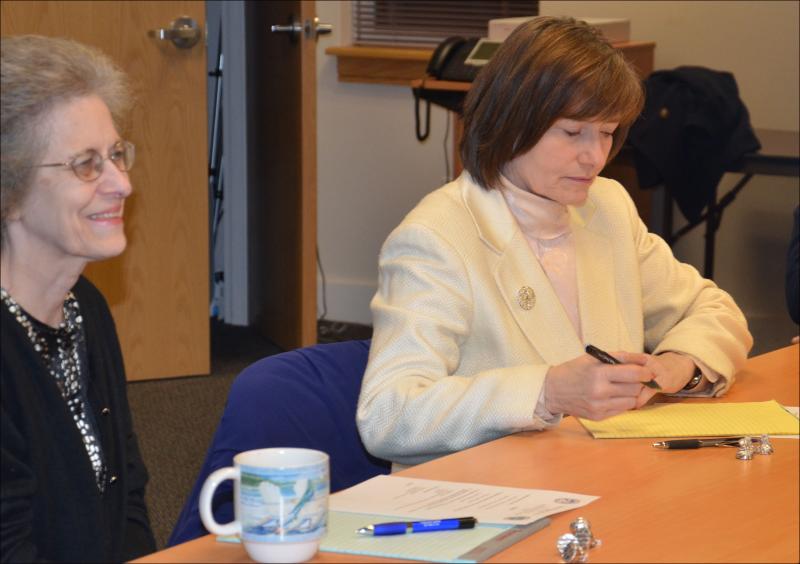 Rockport Acting Town Manager Linda Greenlaw and Camden Town Manager Patricia Finnigan. (Photo by Lynda Clancy)
Rockport Acting Town Manager Linda Greenlaw and Camden Town Manager Patricia Finnigan. (Photo by Lynda Clancy)
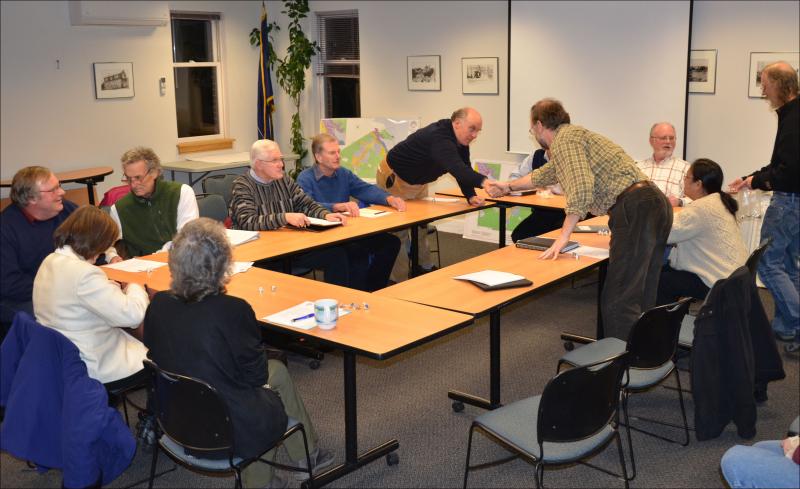 Camden and Rockport Select Boards meet and greet: Around the table, left to right: Rockport Acting Town Manager Linda Greenlaw, Camden Town Manager Patricia Finnigan, Camden Select Board members John French and Leonard Lookner, Rockport Select Board member Charlton Ames, Camden Select Board member Jim Heard leans over the table to shake the hand of Rockport Select Board member Ken McKinley. Camden and Rockport board chairmen Martin Cates and Bill Chapman are at the head of the able. To the right, Rockport Select Board member Tracy Murphy.
Camden and Rockport Select Boards meet and greet: Around the table, left to right: Rockport Acting Town Manager Linda Greenlaw, Camden Town Manager Patricia Finnigan, Camden Select Board members John French and Leonard Lookner, Rockport Select Board member Charlton Ames, Camden Select Board member Jim Heard leans over the table to shake the hand of Rockport Select Board member Ken McKinley. Camden and Rockport board chairmen Martin Cates and Bill Chapman are at the head of the able. To the right, Rockport Select Board member Tracy Murphy.
 Rockport Select Board member Geoffrey Parker distributes coffee to those gathered.
Rockport Select Board member Geoffrey Parker distributes coffee to those gathered.
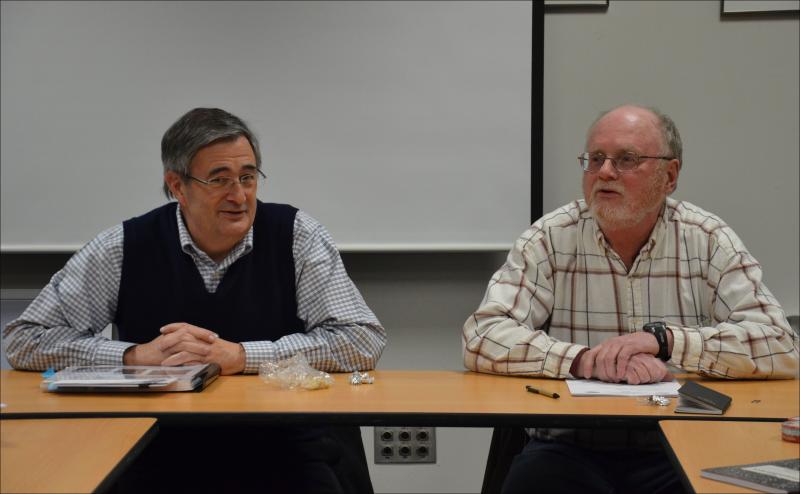 Board chairmen Martin Cates, of Camden, and William Chapman, of Rockport.
Board chairmen Martin Cates, of Camden, and William Chapman, of Rockport.
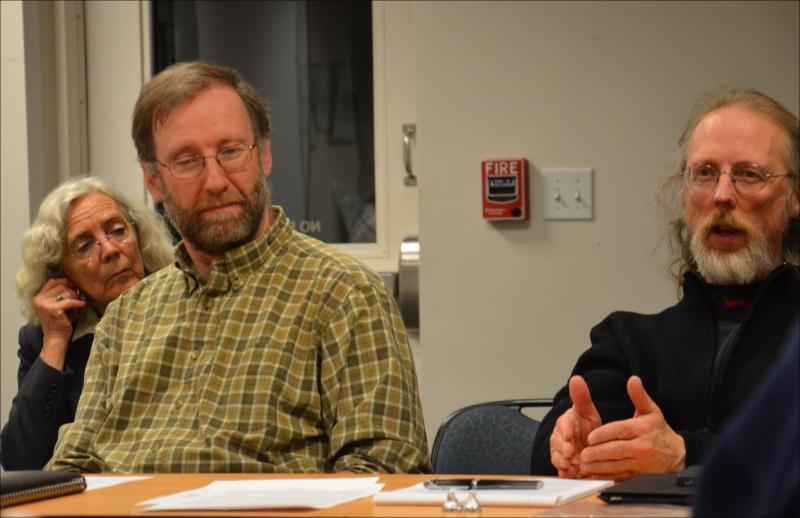 Maine Legislator Joan Welsh (D-Rockport), and Rockport select board members Ken McKinley and Geoffrey Parker.
Maine Legislator Joan Welsh (D-Rockport), and Rockport select board members Ken McKinley and Geoffrey Parker.
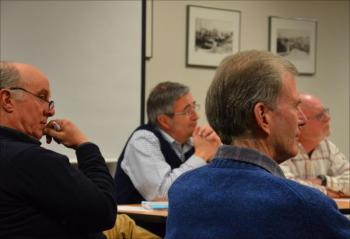 Camden and Rockport select boards convened a joint meeting Jan. 28 at the Rockport Town Office to expand local dialog about how to operate more efficiently together, and identify innovative collaborations. In the photo, Jim Heard and Martin Cates of Camden; and William Chapman and Charlton Ames, of Rockport. (Photo by Lynda Clancy)
Camden and Rockport select boards convened a joint meeting Jan. 28 at the Rockport Town Office to expand local dialog about how to operate more efficiently together, and identify innovative collaborations. In the photo, Jim Heard and Martin Cates of Camden; and William Chapman and Charlton Ames, of Rockport. (Photo by Lynda Clancy)
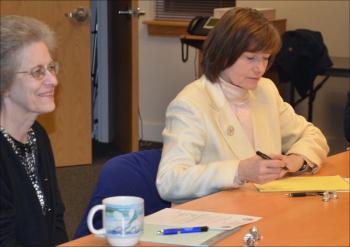 Rockport Acting Town Manager Linda Greenlaw and Camden Town Manager Patricia Finnigan. (Photo by Lynda Clancy)
Rockport Acting Town Manager Linda Greenlaw and Camden Town Manager Patricia Finnigan. (Photo by Lynda Clancy)
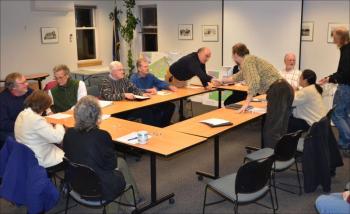 Camden and Rockport Select Boards meet and greet: Around the table, left to right: Rockport Acting Town Manager Linda Greenlaw, Camden Town Manager Patricia Finnigan, Camden Select Board members John French and Leonard Lookner, Rockport Select Board member Charlton Ames, Camden Select Board member Jim Heard leans over the table to shake the hand of Rockport Select Board member Ken McKinley. Camden and Rockport board chairmen Martin Cates and Bill Chapman are at the head of the able. To the right, Rockport Select Board member Tracy Murphy.
Camden and Rockport Select Boards meet and greet: Around the table, left to right: Rockport Acting Town Manager Linda Greenlaw, Camden Town Manager Patricia Finnigan, Camden Select Board members John French and Leonard Lookner, Rockport Select Board member Charlton Ames, Camden Select Board member Jim Heard leans over the table to shake the hand of Rockport Select Board member Ken McKinley. Camden and Rockport board chairmen Martin Cates and Bill Chapman are at the head of the able. To the right, Rockport Select Board member Tracy Murphy.
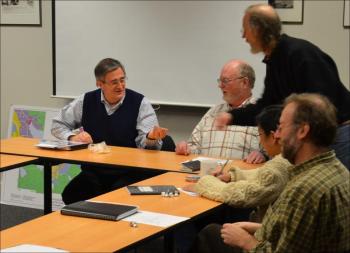 Rockport Select Board member Geoffrey Parker distributes coffee to those gathered.
Rockport Select Board member Geoffrey Parker distributes coffee to those gathered.
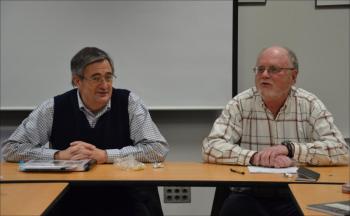 Board chairmen Martin Cates, of Camden, and William Chapman, of Rockport.
Board chairmen Martin Cates, of Camden, and William Chapman, of Rockport.
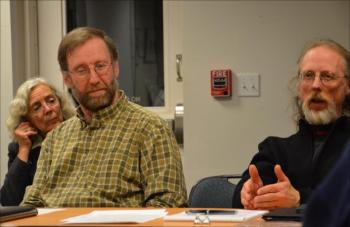 Maine Legislator Joan Welsh (D-Rockport), and Rockport select board members Ken McKinley and Geoffrey Parker.
Maine Legislator Joan Welsh (D-Rockport), and Rockport select board members Ken McKinley and Geoffrey Parker.
ROCKPORT — They talked politics and pathways, legislative policies, sales tax, federal and state revenue sharing, greenbelts, the governor's budget, local ambulance service, the LNG tank proposed for Searsport, and sharing street sweepers and graders. They talked about celebrating a Camden-Rockport founders day, the challenges of managing volunteer municipal committees, and the significance of Camden's downtown in anchoring a community, as well as the diversity of Rockport's five villages. They talked — the 10 members of Camden and Rockport select boards — and they joked. They passsd chocolate and cough drops around, and in the end, they agreed to keep the conversations going, scheduling April 24 for their next meeting.
In the interim, Camden and Rockport Select Board Chairmen Martin Cates and William Chapman will get a cup of coffee and identify an action plan, send it around to the two boards, and prepare the communities to build a more collaborative foundation.
"Everybody here has helped get us to this point," said Rockport Select Board member Geoffrey Parker.
"We are eager to start the dialog," said Cates. "We are close enough neighbors that we should be doing this on a routine basis."
Chapman endorsed that: "I am so glad we can do this. We are actually talking to each other instead of throwing snow balls underneath the arch."
The meeting was historic in that the two boards rarely convene. The last time was in 2004, when the boards discussed partnering the police departments, even sharing law enforcement. A report was issued on that topic four years later in 2008, titled the "Camden and Rockport Police Consolidation Feasibility Study." The idea, and future discussions about tighter public safety relationships, however, were subsequently shelved.
But last year, the board chairmen talked informally about exploring joint collaborations, possibly in the areas of public safety and recreation. After several fits and starts, the meeting was ultimately scheduled soon after the new year, and on Tuesday night, Jan. 29, 10 board members, two town managers, one state legislator and one citizen gathered around the table in Rockport, forging stronger ties across two towns that were originally were one, but villages tussled and split in 1891.
The boards started the meeting describing various projects and initiatives under way in each town, such as Rockport's current design study for a new public library (the existing library is 99 years old, and cramped), and Camden's downtown master plan, whose thrust is geared toward economic and social sustainability.
They spent a good portion of their 90-minute conversation talking about the importance of pathways connecting different parts of the communities, as well as recreational hiking and biking trails, and transportation to the health — economic, social and physical — of a community.
At one time, Camden and Rockport were one town. Then, in the late 1800s, issues of public infrastructure funding arose, including that of the electric railroad, which would make for heated public conversations. A warrant article had been placed on the 1890 Camden Town Meeting asking whether the two villages should split, a proposal that that did not go quietly away. "Meetings were held in both villages to arouse the people for and against the division, sectional feeling ran high and sectional virulance became so acute that for a time it was hardly safe for a Rockport man to favor the proposition to 'divide' or a Camden man to oppose it," wrote Reuel Robinson, in his History of Camden and Rockport, Maine. The fight went to the Legislature, which enacted the town's division in 1891.
Chapman described the increased talks among town leaders, planners and civic committees from Thomaston to Rockland and Union, and Rockport to Camden as beneficial for more comprehensive regional planning. Board members talked about the relocation of Walmart to Thomaston, and that effect on local commercial activity and transportation patterns.
Chapman said Rockport regards the relocation of Walmart to Thomaston as a positive. Rockport is working with Rockland to make Route 1 more pedestrian friendly, "to get people out of the cars and walking to different places. Rockland has a good sidewalk and we have a little one."
He cited the work of the Rockland Economic Development Advisory Committee and Friends of Midcoast Maine in the redesign of the Camden Street commercial strip in Rockland from Maverick Street to the Rockport border, with the possible extension to Warrenton Street in Rockport. A request for design proposals was circulated early in January, with proposals due Feb. 4.
"When Walmart goes away it changes the dynamics," said Chapman. "How do we capitalize on that?"
Rockport Select Board member Ken McKinley commented on the constant flow of commercial and community activity across town lines.
“A rising tide lifts all boats,” he said. "People don't stop at the end of their towns."
As the conversation continued about pathways and trails, as well as economic development, Camden Select Board member Leonard Lookner mentioned the effort of 12 years ago — a great part of it at the initiative of then Rockport Town Manager Don Willard — to build recreational trails on the old rail beds in Rockport that run from the harbor alongside the Goose River through the golf course and toward the new high school. It never got off the ground, in part due to politics, although other initiatives evolved, such as the establishment of the Camden-Rockport Pathways Committee.
Others brought up a longtime community desire to reclaim public access to an old carriage road that once ran alongside the shore from the hospital area to Rockport Harbor. They also talked about extending the sidewalk from Chestnut Street in Camden to Russell Avenue in Rockport, as well as the initiative of John Anders, of Rockport, and Morgan Laidlaw, of Camden, to establish a Kingdom Trails-like network in the area and bring "more folks to the area who might be tad younger than those in this room,” said Cates.
“Speak for yourself,” said Camden Select Board member John French.
"Just by one year," retorted Cates.
The point being: "You've got wonderful hills, we've got wonderful hills," said Cates. "You've got wonderful trails, we've got wonderful trails. Laidlaw is working with Anders, a small committee, and coming back to us in March. Their charge is a first effort on a Kingdom Trail concept."
Lookner mentioned the multipurpose trail that winds for six miles through Camden Hills State Park, and used by hikers, horseback riders and bicyclists.
"It has been very well restored by state of Maine," he said.
Camden Select Board member Don White said there are: "a lot more people who would appreciate some sort of trail system, or pathways system. How wonderful to get pathways right along Route 1 to Rockland. People love to walk, like to bike. We need to get pressure on the Maine Department of Transportation."
"Get people out of their cars," said Chapman.
"Can the two towns work together on points of recreation," asked Parker. "Establish a more formal relationship and a place to disseminate that information. Maybe it is an app, like Leonard suggests, not a person."
The boards also touched on possibly sharing an economic development director, acknowledging the retirement of Rockport's Planner and Community Development Director Tom Ford.
Camden Select Board member Jim Heard asked Rep. Welsh what the mood is in Augusta regarding the governor's budget and proposed elimination of municipal revenue sharing.
"Nobody is happy with shifting revenue onto property taxes," she said. "I don't think Republicans are happy with that, but it is too early to tell. We are still working on the supplemental budget."
She said: "I don't think the Draconian shift the governor has proposed will happen. But revenue sharing has been cut every year and I don't think it will be restored fully. But I can't believe those full cuts will happen. But there are many cuts in this budget, so many problems in so many places."
French urged Welsh to encourage the Legislature to move quickly with making budgetary decisions.
"We've been feeling the pinch on services for many years," said French. "No matter what the state does, it needs to do it quickly so we know. Some towns have March town meetings. We need to know what to do."
"That is important," said Welsh. "I will let people know."
The boards then touched briefly on mutual aid, as well as shared infrastructure, including wastewater treatment.
"Both our communities are blessed with good department heads," said Lookner.
They also mentioned current financial issues faced by Camden First Aid Association, the ambulance service that tends to Camden, Rockport and other area towns.
"Camden First Aid needs help," said Lookner.
Chapman said the town managers are working hard with Camden First Aid to determine financial arrangements.
They agreed that emergency response certifications and regulations governing training in Maine are not as efficient as those of other states and suggested to Welsh to explore that issue in Augusta.
By the end of the meeting, the boards agreed to read each other's comprehensive plan, and consider including in future plans sections that address how to deal with neighboring communities.
"Read them," said Chapman. "What do we have in common? What is it we can do together?"
They also heard from White about the effort to study whether the Midcoast could successfully establish a public bus transportation system, and heard from Parker a initiative by the school boards to lobby Congressman Angus King to adjust visa regulations for international students studying in local public schools.
And, they agreed that (and empathized with) Searsport municipal government has a monumental job deciding whether to allow a liquified natural gas tank to be built on its shoreland.
Editorial Director Lynda Clancy can be reached at lyndaclancy@penbaypilot.com; 706-6657.
Event Date
Address
United States

